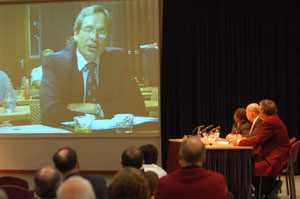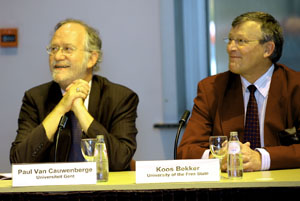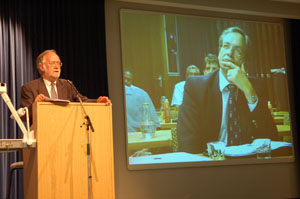The University of the Free State (UFS) recently formalised its co-operation ties with the University of Ghent in Belgium. The two universities signed a memorandum of understanding during the Accenta Trade Fair, an annual event that incorporates activities such as business seminars, cultural events and exhibitions.
 The signing of the memorandum of understanding took place via a live video conference linking the two institutions of higher learning.
The signing of the memorandum of understanding took place via a live video conference linking the two institutions of higher learning.
“It was a wonderful moment because, after signing the memorandum of understanding on the Main Campus in Bloemfontein, the Rector and Vice-Chancellor, Prof. Frederick Fourie, actually showed us his signature on the screen while we were in Ghent”, said Prof. Koos Bekker of the Department of Public Management at the UFS, who was part of the delegation from the Free State.
The delegation consisted of the Premier, Ms Beatrice Marshoff, and several MECs and senior officials from the Free State provincial government, as well as the mayor, councillors and senior officials of the Mangaung Local Municipality. Several staff members of the UFS were also part of the delegation.
According to Prof. Bekker, the two universities will co-operate in various areas in terms of the memorandum of understanding.
 “In the short term the collaboration will be focused on bio-fuels, public management and the digital divide, while discussions in other areas such as health services and organised crime are also under way,” he said.
“In the short term the collaboration will be focused on bio-fuels, public management and the digital divide, while discussions in other areas such as health services and organised crime are also under way,” he said.
As part of the memorandum of understanding, the following collaborative efforts are also envisaged:
Mr Lyndon du Plessis, a lecturer in the Department of Public Management, will be enrolled for a Ph.D. at both universities as from September 2008.
A research project involving both universities, the Mangaung Local Municipality and the City of Ghent, will be undertaken.
An investigation will be conducted by both universities regarding the possibility of writing a book on performance management in the public sector (negotiations with the publisher in this regard are under way).
An exchange programme involving students and staff from both universities will be established.
Academics from the UFS delivered papers during one of the forums that formed part of the Accenta Trade Fair programme in Ghent. Prof. Koos Bekker and Mr Lyndon du Plessis from the Department of Public Management delivered papers on strategic planning in practice on the first day of the event, which was devoted to scientific seminars. On the second day Prof. Lucius Botes, Director of the Centre for Development Support at the UFS, delivered a paper on economic development issues, and on the third day Prof. Gustav Visser, Associate Professor in the Department of Geography at the UFS, delivered a paper on tourism.
 Papers on bridging the digital divide were presented during the video conference by academics in both Bloemfontein and Ghent.
Papers on bridging the digital divide were presented during the video conference by academics in both Bloemfontein and Ghent.
As guests of honour at the Accenta Trade Fair, the Free State delegation was allocated the main exhibition floor space, covering 1 092 m². The Main Exhibition Hall covers a total surface area of 40 000 m². The Accenta Trade Fair attracts an average of 100 000 visitors annually. The UFS also participated as an exhibitor at the Trade Fair.
This visit was a follow-up of the previous visit, during which the Free State delegation was hosted by the City of Ghent and the provincial government of East Flanders for planning purposes from 14 to 24 April 2007.
Media Release
Issued by: Mangaliso Radebe
Assistant Director: Media Liaison
Tel: 051 401 2828
Cell: 078 460 3320
E-mail: radebemt.stg@ufs.ac.za
14 November 2007